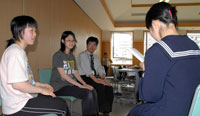
Drama Club members answering questions from a junior writer (on the right).

縲For over 40 years, the Funairi High School Drama Club has staged performances at junior high schools in the Hiroshima area. Currently with 20 members, they have been performing the play 窶廚ranes窶・since last fall.
縲The setting for 窶廚ranes窶・is at a student council meeting at a high school. The students are folding paper cranes and seeking to understand the meaning of this activity. As they work, they reveal their family窶冱 experience in the bombing and the bullying they have faced. The play challenges the audience to reflect on the bombing and to consider their own responsibility in promoting peace.
縲Before they created the play, the Drama Club visited Peace Memorial Park and Peace Memorial Museum and then wrote about their impressions. They talked about the subject matter and then, based on this discussion, their faculty advisor, Takashi Kurose, 43, wrote the script.
縲窶弋he number of A-bomb survivors is decreasing so we have to carry on their message through this activity,窶・said Natsuki Nakamae, 17. And Mr. Kurose remarked, 窶廾ur plays aren窶冲 perfect, but we do the best we can to make a play that works well with each year窶冱 group.窶・The Funairi High School Drama Club maintains a tradition of success in promoting peace through their efforts. (Aya Nakashige, 17)
縲Honkawa Elementary School is located approximately 350 meters from the hypocenter of the atomic bomb that destroyed Hiroshima. 400 students from this school were killed in the blast. For the past two years, the 6th graders have written musical plays based on the story of survivor Kiyoko Imori, 73, a former student, and all the students in the school take part in this project.
縲The title of last year窶冱 play was 窶弋he Window of Honkawa, Open to Tomorrow窶・ The plays tells the story of present-day students who travel back in time to the old Honkawa Elementary School of 62 years ago, on the day before the bombing. The main performers were the 6th graders while the younger students were involved in dances or in the chorus.
縲Last year I was a student at Honkawa Elementary School and I helped make a school newspaper to report the progress of the play. As the day of the performance approached, the students bonded together. As a result, I think our play was successful in conveying the horror of the atomic bomb and the waste of war. (Reika Konno, 12)
縲Imagine if an atomic bomb was dropped in the midst of our lives today as we chat with friends on our mobile phones and stroll through the city center. Last year I saw a play called 窶廬 Pray窶・that conveys the horror of this contrast between our cheerful world and sudden tragedy.
縲Yoko Kihara, the daughter of an A-bomb survivor and the director of the play, said, 窶廬 want audiences to feel the horror of suddenly falling from light into darkness.窶・The play was first performed in 1996 and this year another performance will be held on August 5th.
縲Ms. Kihara窶冱 mother entered Hiroshima just after the bombing. She heard her mother窶冱 story when she was young and she was also examined at the Radiation Effects Research Foundation.
縲Ms. Kihara stresses the importance of a smile while on stage. At the same time, she believes a smile must be maintained in our lives, too. 窶弃eace can be lost in an instant,窶・she says, 窶徭o always uphold peace.窶・/p>
縲Ms. Kihara encourages everyone, even those without dance experience, to take part in her play. (Yuki Sakata, 13)
縲The Misuzugaoka High School Drama Club performed an abridged version of five plays they have created at a presentation of peace activities by junior high schools and high schools in the Hiroshima area.
縲Through dialogue and songs from their plays, they tried to convey the idea of 窶從ever giving up in this life while sharing compassion for others.窶・/p>